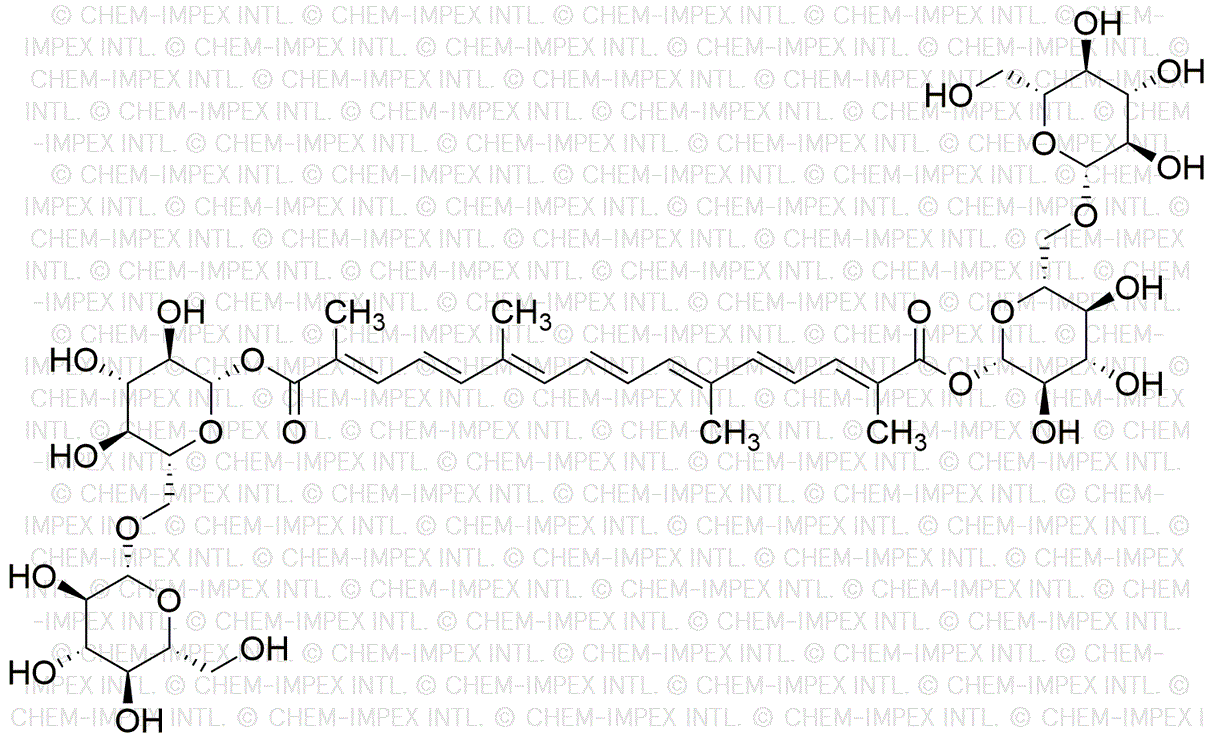Crocin is widely utilized in research focused on:
- Natural Food Coloring: Crocin is a natural pigment derived from saffron, making it an excellent alternative to synthetic dyes in the food industry. It enhances the color of various products, such as sauces and desserts, while providing a health-conscious option for consumers.
- Antioxidant Applications: This compound is known for its strong antioxidant properties, which can help in the formulation of dietary supplements aimed at reducing oxidative stress and promoting overall health.
- Pharmaceutical Uses: Crocin has shown potential in the treatment of various diseases, including cancer and neurodegenerative disorders. Its ability to inhibit tumor growth makes it a subject of interest in drug development.
- Cosmetic Industry: Due to its skin-beneficial properties, crocin is increasingly used in skincare products. It helps in improving skin tone and texture, making it a desirable ingredient for beauty formulations.
- Research in Neuroprotection: Studies suggest that crocin may have neuroprotective effects, making it valuable in research related to cognitive health and conditions like Alzheimer’s disease.
General Information
Properties
Safety and Regulations
Applications
Crocin is widely utilized in research focused on:
- Natural Food Coloring: Crocin is a natural pigment derived from saffron, making it an excellent alternative to synthetic dyes in the food industry. It enhances the color of various products, such as sauces and desserts, while providing a health-conscious option for consumers.
- Antioxidant Applications: This compound is known for its strong antioxidant properties, which can help in the formulation of dietary supplements aimed at reducing oxidative stress and promoting overall health.
- Pharmaceutical Uses: Crocin has shown potential in the treatment of various diseases, including cancer and neurodegenerative disorders. Its ability to inhibit tumor growth makes it a subject of interest in drug development.
- Cosmetic Industry: Due to its skin-beneficial properties, crocin is increasingly used in skincare products. It helps in improving skin tone and texture, making it a desirable ingredient for beauty formulations.
- Research in Neuroprotection: Studies suggest that crocin may have neuroprotective effects, making it valuable in research related to cognitive health and conditions like Alzheimer’s disease.
Documents
Safety Data Sheets (SDS)
The SDS provides comprehensive safety information on handling, storage, and disposal of the product.
Product Specification (PS)
The PS provides a comprehensive breakdown of the product’s properties, including chemical composition, physical state, purity, and storage requirements. It also details acceptable quality ranges and the product's intended applications.
Certificates of Analysis (COA)
Search for Certificates of Analysis (COA) by entering the products Lot Number. Lot and Batch Numbers can be found on a product’s label following the words ‘Lot’ or ‘Batch’.
*Catalog Number
*Lot Number
Certificates Of Origin (COO)
This COO confirms the country where the product was manufactured, and also details the materials and components used in it and whether it is derived from natural, synthetic, or other specific sources. This certificate may be required for customs, trade, and regulatory compliance.
*Catalog Number
*Lot Number
Safety Data Sheets (SDS)
The SDS provides comprehensive safety information on handling, storage, and disposal of the product.
DownloadProduct Specification (PS)
The PS provides a comprehensive breakdown of the product’s properties, including chemical composition, physical state, purity, and storage requirements. It also details acceptable quality ranges and the product's intended applications.
DownloadCertificates of Analysis (COA)
Search for Certificates of Analysis (COA) by entering the products Lot Number. Lot and Batch Numbers can be found on a product’s label following the words ‘Lot’ or ‘Batch’.
*Catalog Number
*Lot Number
Certificates Of Origin (COO)
This COO confirms the country where the product was manufactured, and also details the materials and components used in it and whether it is derived from natural, synthetic, or other specific sources. This certificate may be required for customs, trade, and regulatory compliance.


